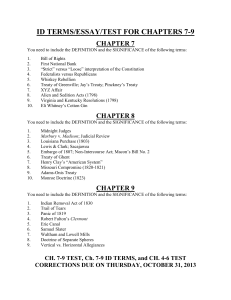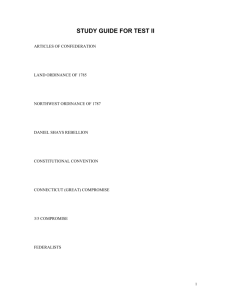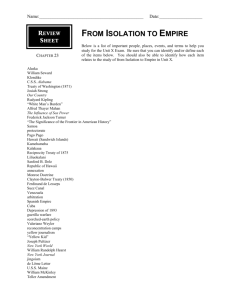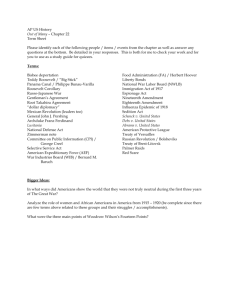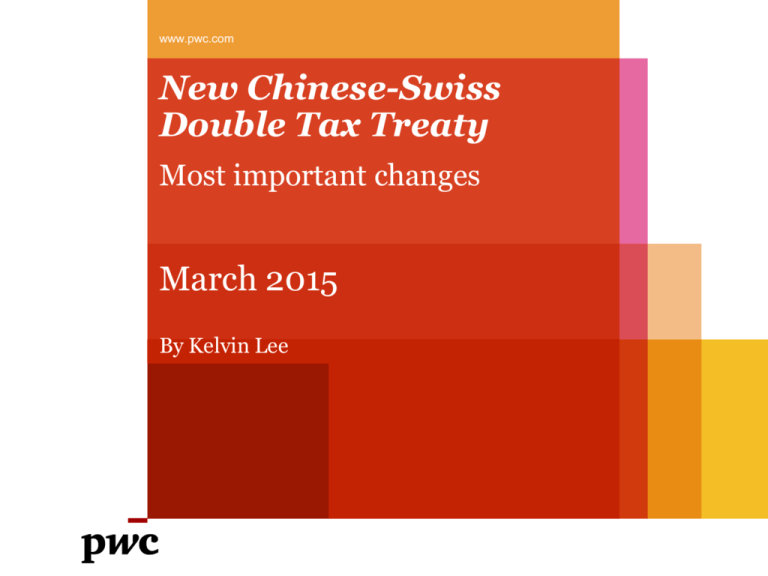
www.pwc.com
New Chinese-Swiss
Double Tax Treaty
Most important changes
March 2015
By Kelvin Lee
Kelvin Lee
Director
China Tax & Business Advisory Services
Tel: +86 (10) 6533 3068
Email: kelvin.lee@cn.pwc.com
Kelvin Lee started his China and Hong Kong tax business consulting career with PricewaterhouseCoopers Hong
Kong. Before moving to Beijing, he previously served in the China firm's offices in Guangzhou, Shanghai and
Hong Kong of the PricewaterhouseCoopers network.
Kelvin is experienced in advising on cross-border tax planning to mitigate taxes for over 20 years. Kelvin also
has broad experience in other Chinese taxes and business advisory. He currently serves a number of
multinational and Chinese domestic enterprises in a wide variety of industries, including offshore oil project in
Tianjin, clean energy projects, real estate, manufacturing and high-tech industries. On daily basis, he also
works closely with Chinese authorities in tax, finance, foreign exchange and commerce at both national and
local levels.
Kelvin holds a Master’s Degree from Business School of Hong Kong University of Science and Technology and a
Bachelor’s Degree in Accountancy from University of Hong Kong Polytechnics. In addition, Kelvin is a fellow
member of UK Chartered Association of Certified Accountants and Hong Kong Institute of Certified Public
Accountants.
Professional Qualifications
Kelvin holds a Master’s Degree from Business School of Hong Kong University of Science and Technology and a
Bachelor’s Degree in Accountancy from University of Hong Kong Polytechnics. In addition, Kelvin is a fellow
member of UK Chartered Association of Certified Accountants and Hong Kong Institute of Certified Public
Accountants.
PwC
Agenda
Page
1
Background
3
2
New double tax treaty and implications
5
3
Summary
Chinese-Swiss Double Tax Treaty
PwC
18
March 2015
Slide 3
Background
1
Chinese-Swiss Double Tax Treaty
PwC
March 2015
Slide 4
Background
Transition of double tax treaty between China and Switzerland
• One of the first comprehensive double tax treaties of China with a European country
Old version Signed
in 1990
Never revised
since 1990
New version
started negotiation
from 2010
New version
signed on 25
September 2013
• not reflecting the fast development of economic ties between China and Switzerland since
1990
• not fully in line with current political developments regarding international taxation and
exchange of information
• Aiming at amending the existing China and Switzerland double tax treaty
• New version effective from 1 January 2015
Chinese-Swiss Double Tax Treaty
PwC
March 2015
Slide 5
New double tax treaty and implications
2
Chinese-Swiss Double Tax Treaty
PwC
March 2015
Slide 6
New double tax treaty and implications
Art. 10: Dividends
Old Version:
Withholding tax (“WHT”) rate
of 10% applies to all
dividend payments if the
recipient is the beneficial
owner of the dividends.
New Version:
a) WHT rate of 5% applies if the
beneficial owner is a company
(other than a partnership) which
holds directly at least 25% of
the capital of the company
paying the dividends;
b) WHT rate of 10% in all other
cases.
Chinese-Swiss Double Tax Treaty
PwC
March 2015
Slide 7
New double tax treaty and implications (Cont’d)
Art. 10: Dividends (Cont’d)
Example
Old
New
Version Version
Beneficial
Owner (“BO”)
100%
Subsidiary A
Switzerland
China
25%
100
Dividend
Amount
100
100
WHT Amount
10
5
Tax Saving
Amount
-
5
Tax Implication
in Switzerland
?
?
Subsidiary B
Chinese-Swiss Double Tax Treaty
PwC
March 2015
Slide 8
New double tax treaty and implications (Cont’d)
Art. 12: Royalties
•
•
Old Version
In general a WHT rate of 10%
applies to royalty payments if
the recipient is the beneficial
owner of the royalties;
In case of leasing fees, only
60% of the gross amount of the
leasing fees shall be subject to
WHT, i.e. leasing fees are
subject to WHT at an effective
rate of 6%.
•
•
Chinese-Swiss Double Tax Treaty
PwC
New Version:
WHT rate of 9% applies to all
royalty payments if the beneficial
owner of the royalties is a
resident of the other Contracting
State;
No special treatment for leasing
fees
March 2015
Slide 9
New double tax treaty and implications (Cont’d)
Art. 12: Royalties (Cont’d)
Example
Old
New
Version Version
Beneficial
Owner (“BO”)
100%
Subsidiary A
Switzerland
China
100
Royalties
Amount
100
100
WHT Amount
10
5
Tax Saving
Amount
-
5
Tax Implication
in Switzerland
?
?
Co B
Chinese-Swiss Double Tax Treaty
PwC
March 2015
Slide 10
New double tax treaty and implications (Cont’d)
Only “Beneficial Owner” can claim treaty benefits in respect of dividends,
interest, royalties and capital gains under double tax treaty
Seven unfavourable factors in assessing the “BO” status
1. Upward payment of the income within 12
months.
4. No controlling rights on the income or the
assets, and bears no or very little risk.
2. No other business activities.
5. Low tax burden on the income.
3.The assets, scale of operations, and
employees are not commensurate with the
amount of the income.
6. Another similar loan contract with a third
party.
7. Another licensing or transfer contract with a
third party.
Chinese-Swiss Double Tax Treaty
PwC
March 2015
Slide 11
New double tax treaty and implications (Cont’d)
Seven unfavourable factors in assessing the “BO” status
All the relevant factors should be analyzed
comprehensively when assessing the BO status.
The BO status should not be denied simply because
one of the seven unfavourable factors exists.
The BO status should not be allowed merely because
there is no motivation of avoiding/reducing tax.
Chinese-Swiss Double Tax Treaty
PwC
March 2015
Slide 12
New double tax treaty and implications (Cont’d)
“Safe-harbour” rule for dividend
Scenario 3
Swiss Listed Swiss
TRE (Co.A)
Scenario 2
Swiss Listed Swiss
TRE (Co.A)
Scenario 1
Switzerland
Chinese TRE or Swiss
TRE (Co.B)
100%
Swiss Listed Swiss
TRE (Co.A)
Dividend
China
100%
Chinese TRE (Co.D)
100%
Swiss TRE (Co.C)
Swiss TRE (Co.C)
Dividend
Chinese TRE (Co.D)
Dividend
Chinese TRE (Co.D)
Under the Safe-harbour rule, BO status can be
directly granted to Swiss TRE who is the immediate
recipient of the China sourced dividends
Chinese-Swiss Double Tax Treaty
PwC
March 2015
Slide 13
New double tax treaty and implications (Cont’d)
Art. 13: Capital gains
Old Version:
Capital gains from the
sale of property not
specifically mentioned
in the preceding
paragraphs are
taxable only in the
Contracting State of
which the seller is a
resident
(residence principle)
Chinese-Swiss Double Tax Treaty
PwC
Additional article:
Capital gains from the sale of
shares in a company which is a
resident of the other Contracting
State may be taxed in that other
Contracting State if the recipient of
the gains, at any time during the
twelve-month period preceding
such alienation, had a
participation, directly or indirectly,
of at least 25 per cent in the capital
of that company
(source principle)
Same Version:
Gains from the alienation
of any property, other than
that referred to in the
preceding paragraphs,
shall be taxable only in the
Contracting State of which
the alienator is a resident.
March 2015
Slide 14
New double tax treaty and implications (Cont’d)
Art. 13: Capital gains (cont’d)
Example 1 – Direct Transfer
Old
New
Version Version
Capital
gains
Company A
(transferor)
Company c
(transferee)
Switzerland
China
25% (note 1)
Equity
Company B
Capital gains
taxable in
Switzerland?
Y
Y
Capital gains
taxable in China?
N
Y
Tax credit apply
in Switzerland?
?
?
1. at any time during the twelve-month period preceding the transaction
Chinese-Swiss Double Tax Treaty
PwC
March 2015
Slide 15
New double tax treaty and implications (Cont’d)
Art. 13: Capital gains (cont’d)
Example 2 – Direct Transfer
Old
New
Version Version
Capital
gains
Company A
(transferor)
Company c
(transferee)
Switzerland
China
24% (note 1)
Equtiy
Company B
Capital gains
taxable in
Switzerland?
Y
Y
Capital gains
taxable in China?
N
N
Tax credit apply
in Switzerland?
?
?
1. at any time during the twelve-month period preceding the transaction
Chinese-Swiss Double Tax Treaty
PwC
March 2015
Slide 16
New double tax treaty and implications (Cont’d)
Art. 13: Capital gains (cont’d)
Example 3 – Indirect Transfer – Apply Chinese Local Tax Rules
Capital
gains
Company A
(transferor)
100%
Intermediate
Holding Co.
Company C
(transferee)
100%
CIT obligation is decided
by whether this transaction
has reasonable commercial
purpose or not
25%
Switzerland
China
Company B
Chinese-Swiss Double Tax Treaty
PwC
March 2015
Slide 17
New double tax treaty and implications (Cont’d)
Art. 13: Capital gains (cont’d)
Seven general factors for assessing the reasonable commercial purpose
1. China content of the
equity value of the overseas
company being transferred
3. Functions performed and
risks undertaken
4. The existence duration of
the shareholders, business
model of the structure
5. Overseas income tax
payment for the indirect
equity transfer
Chinese-Swiss Double Tax Treaty
PwC
2. China content of the asset
value and income of the
overseas company being
transferred
6. Whether the indirect
investment and transfer of
the Taxable Properties in
China can be substituted by a
direct investment and direct
transfer equity transfer
Holistic
approach
7. The applicability of any
treaty protection
8. Others
March 2015
Slide 18
New double tax treaty and implications (Cont’d)
Art. 13: Capital gains (cont’d)
Red Zone
Chinese-Swiss Double Tax Treaty
PwC
Green Zone
March 2015
Slide 19
New double tax treaty and implications (Cont’d)
Art. 27: Exchange of information
Old Version (Art. 26):
• The competent authorities shall only exchange such information as is necessary for
carrying out the provisions of the double tax treaty.
New Version:
• The new provisions regarding exchange of information are in line with current
international standards.
Chinese-Swiss Double Tax Treaty
PwC
March 2015
Slide 20
New double tax treaty and implications (Cont’d)
Art. 8 / Protocol: Shipping and air transport
New Version:
• Art. 8 itself remains unchanged;
• The protocol stipulates that no Value Added Tax (“VAT”) and no Business Tax
(“BT”) shall be levied on such international shipping and air transport services (even
though VAT and BT are in general not covered by DTTs):
a) for residents of Switzerland carrying on the operation of ships or aircraft in
international traffic, supplies of international transportation shall be exempt from BT
or any other similar tax imposed on the gross receipts in China, or shall be zerorated under VAT in China and the input tax attributable to such supplies shall be
creditable to the same extent as it is to business enterprises resident in China; and
b) for residents of China carrying on the operation of ships or aircraft in international
traffic, supplies of international transportation shall be zero-rated under VAT in
Switzerland and the input tax attributable to such supplies shall be creditable to the
same extent as it is to business enterprises resident in Switzerland.
Chinese-Swiss Double Tax Treaty
PwC
March 2015
Slide 21
Summary
3
Chinese-Swiss Double Tax Treaty
PwC
March 2015
Slide 22
Summary
downside
Chinese-Swiss Double Tax Treaty
PwC
improvements
March 2015
Slide 23
Thank you !
This publication has been prepared for general guidance on matters of interest only, and does
not constitute professional advice. You should not act upon the information contained in this
publication without obtaining specific professional advice. No representation or warranty
(express or implied) is given as to the accuracy or completeness of the information contained
in this publication, and, to the extent permitted by law, PricewaterhouseCoopers AG, its
members, employees and agents do not accept or assume any liability, responsibility or duty of
care for any consequences of you or anyone else acting, or refraining to act, in reliance on the
information contained in this publication or for any decision based on it.
© 2015 PwC. All rights reserved. In this document, “PwC” refers to PricewaterhouseCoopers
AG which is a member firm of PricewaterhouseCoopers International Limited, each member
firm of which is a separate legal entity.




